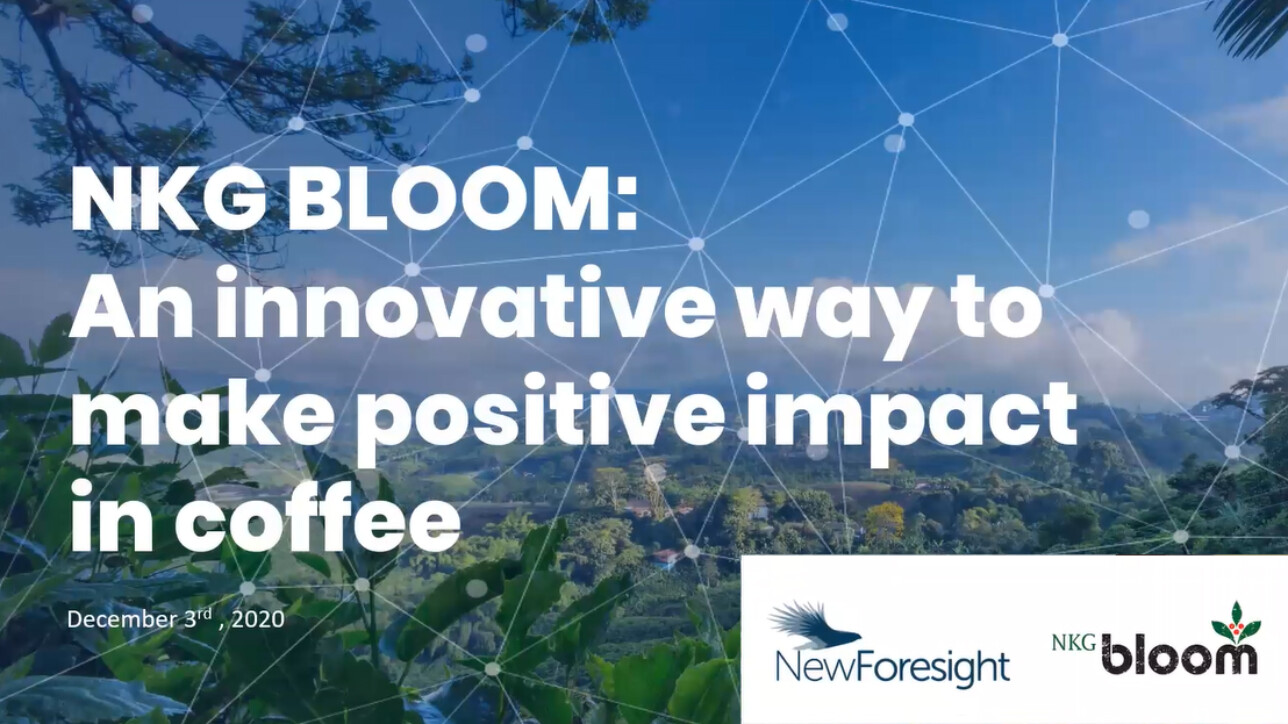December 2020
How is NKG BLOOM different from a certification? Catalina Eikenberg, head of the Neumann Kaffee Gruppe (NKG) Sustainable Business Unit, and Silvana Paniagua, a principal at NewForesight, a Netherlands consultancy firm that considers tough sustainability challenges, discussed this question during a Dec. 3. webinar.
Their conversation is available to watch online:
Prefer a summary? Below are three excerpts from their 45-minute discussion.
To be clear, NKG is supportive of certifications and in some instances NKG BLOOM coffees may also be certified Organic, Rainforest Alliance or Fairtrade. The goal here is to clarify the differences.
“We don’t just tick the box.”
“Normally when there is an issue, we see it’s not just one farm. For example, in a situation where farmers are using a certain pesticide that is toxic, we see that the use tends to be for an entire region, or for an entire community. … So we come in, we do awareness sessions, we train our own staff first, and then we train the farmers. We tell them why it’s dangerous, why it is important that they switch, and we help them to look for solutions.
“In this kind of example, often it’s because that is the only pesticide available in that remote place in, say, rural Honduras. So then we work with distributors of agro-chemicals to try to make them offer other products. We have a global partnership with Yara, which is one of the leading companies in the space of agro-chemicals that are sustainable in the long term, and we are working with them to develop more distribution networks, so farmers have access to more inputs that are environmentally friendly.
So, I think this is another key difference from certifications. We don’t just come in and try to tick a box, or say, ‘Oh, you can’t tick this box, too bad.’ We really try to solve the pain point. To see, why is it that they are using this pesticide and not another. We try to solve that pain point for the whole community.” — Catalina
“The difference, in a nutshell, is three things.”
“NKG BLOOM provides a service package to enable farmers to maximize their return. In the case of certifications, what we see is that normally the certification by itself provides the framing to the farmer, but access to services is not included in the framing, per se. It may very well be that the creator coordinates access to other services … but that is not always warranted, which is important to mention.
“Also, NKG BLOOM is driven by continuous improvement and is outcome based. So, this is not about checking the box [that says the farmer is meeting certain standards.] … The idea is that the farmer improves. Though in BLOOM, there is a set of criteria, particularly related to human rights, that has a zero-tolerance criteria. But the rest is inclusive, so the farmer can improve.
“Lastly, NKG BLOOM is a business-to-business solution. There is no label … The moment a roaster buys BLOOM, automatically it is in their supply chain and they can claim the positive impacts that BLOOM is creating.” — Silvana
“The idea is to enable the farmer to make a pretty big jump.”
“With regard to prices, we find it’s a variable that’s very hard to influence. With regards to premiums … certifications have a premium that is very positive, and farmers appreciate it very much. But it tends to be a very small percentage of the total price. Often it’s maybe 5 percent, or in some cases 3 or 2 percent or not even 1 percent increases versus the base price, so it winds up being a lot of effort on the farmer’s part to comply with a lot of standards, and then the premium is very small.
“With BLOOM, when we bring this service package, including things like fertilizer, training, financing, the whole thing, we are aiming at productivity increases of something like 25 percent, up to 200, 300 percent. And we know that we can achieve that kind of massive increase because smallholder farmers are right now really operating significantly below their potential. … In Africa, they may be pretty much just collecting what the trees produce but they are not actively managing the farm as a business. So, when we come in with the ecosystem of services, it’s with the idea to enable the farmer to make a pretty big jump in their productivity, which means a pretty big jump in their net income.” — Catalina
As ever, we invite you to learn more at the initiative on this website and to reach out with your own questions at
bloom@nkg.coffee.



